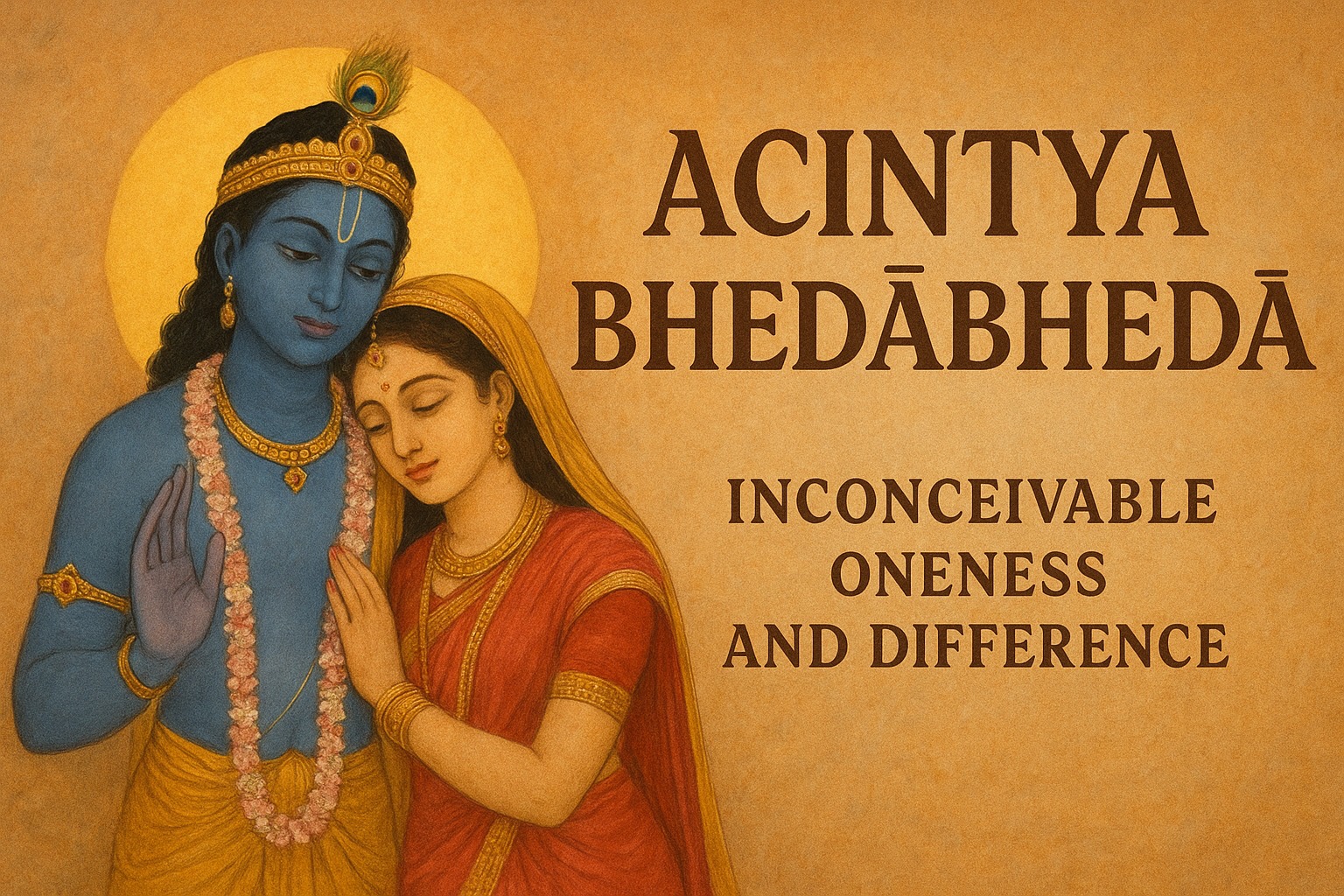
Introduction
In the search for truth, one question arises again and again:
“Are we one with God, or different from Him?”
Some say we are absolutely one with God (Advaita).
Others say we are eternally different (Dvaita).
But the Vedas give statements that support both oneness and difference.
How do we reconcile this?
The answer lies in the beautiful philosophy of Bhedābheda Tattva –
“We are simultaneously one with, and different from, the Supreme Lord.”
🌸 1. Śruti Evidence (Upaniṣads)
Statements of Oneness (Abheda)
- Chāndogya Upaniṣad 6.8.7 : “Tat tvam asi” – “You are that [Brahman].”
- Bṛhad-āraṇyaka Upaniṣad 1.4.10 : “Aham brahmāsmi” – “I am Brahman.”
👉 These show that the jīva shares the Lord’s spiritual nature.
Statements of Difference (Bheda)
- Śvetāśvatara Upaniṣad 6.13 : “nityo nityānāṁ cetanaś cetanānām” – The Lord is the eternal among eternals, the supreme conscious being among all conscious beings.
- Śvetāśvatara Upaniṣad 4.6 : “Dvā suparṇā sayujā sakhāyā” – The two birds (jīva and Paramātmā) sit on one tree: one enjoys, the other simply witnesses.
👉 These show that the jīva is always distinct from the Lord.
⚖ Conclusion: The Vedas themselves teach both unity and distinction.
🌺 2. Bhagavad-gītā Evidence
- Bhagavad-gītā 15.7
“mamaivāṁśo jīva-loke jīva-bhūtaḥ sanātanaḥ”
– The jīva is My eternal part and parcel.
👉 Just as the sun and its rays are one in nature but different in individuality, so too the jīva and God are one-yet-different. - Bhagavad-gītā 9.4–5
“mayā tatam idaṁ sarvaṁ… na cāhaṁ teṣv avasthitaḥ”
– Krishna says: “Everything rests in Me, yet I am not in them.”
👉 A clear statement of oneness and difference existing together.
🌼 3. Śrīmad Bhāgavatam – The Final Word
- SB 3.9.28 (Brahmā’s prayers):
“O Lord, You are one without a second, yet You manifest as many through Your inconceivable energy.” - SB 10.87.2 (Śruti-stuti):
“In You, both difference and non-difference are experienced, and this is not contradictory, due to Your inconceivable power.”
👉 The Bhāgavatam reconciles all contradictions through the Lord’s acintya-śakti (inconceivable potency).
🌿 4. Logic Everyone Can Relate To
- Fire and Heat: Fire cannot exist without heat, and heat cannot exist without fire. They are one, yet different.
- Sun and Sunshine: The sun and its rays are one in quality, yet different in individuality.
- Body and Soul: The body belongs to the soul, yet the soul is always distinct.
Just as these examples are easily understood, so too is our relationship with God: inseparably one, yet eternally distinct.
🌸 5. Respecting All Ācāryas
- Śrī Madhvācārya (Dvaita): Strongly emphasized difference to defeat Advaita.
- Śrī Rāmānujācārya (Viśiṣṭādvaita): Showed oneness with distinction, like body and soul.
- Śrī Caitanya Mahāprabhu (Acintya-bhedābheda): Harmonized both – oneness and difference are simultaneous, by God’s inconceivable power.
🌿 How They Complete Each Other
- Rāmānuja safeguarded the oneness aspect, without falling into Advaita illusion.
- Madhva safeguarded the difference aspect, ensuring the jīva never becomes God.
- Caitanya harmonized both truths: God is inconceivably one and different from His energies.
👉 Just like different instruments in an orchestra, each ācārya highlighted one melody. Together, they produce the complete symphony of truth.
Thus, Bhedābheda does not reject Madhva or Rāmānuja. It embraces their truths and unites them.
📊 Comparison of Vedānta Schools on Oneness & Difference
| Aspect | Śrī Rāmānujācārya – Viśiṣṭādvaita | Śrī Madhvācārya – Dvaita | Śrī Caitanya Mahāprabhu – Acintya-bhedābheda |
|---|---|---|---|
| Relationship of Jīva and God | Jīva is like the body of God, inseparable yet dependent | Jīva is eternally different from God, servant of Viṣṇu | Jīva is eternally one and different from God, His part-and-parcel |
| Unity (Abheda) | God is the inner controller of the jīva and matter | Accepts similarity in dependence, but no oneness in essence | Jīva is of same quality (cit), like sun and sunshine |
| Difference (Bheda) | Jīva and matter are real, distinct attributes of God | Jīva and God are absolutely different | Difference is eternal, but exists with unity |
| View of Māyā / World | Real, the body of God, transformed by His will | Real, completely separate from God | Real, energy of God (śakti), one yet distinct |
| Highest Goal | Loving service in Vaikuṇṭha | Loving service in Vaikuṇṭha | Loving service in Goloka / Vraja, in intimate rasa |
| Key Emphasis | Unity-in-diversity (qualified oneness) | Absolute difference (fivefold: pañcabheda) | Harmony: difference and non-difference are simultaneous |
| Analogy | Soul and body | Master and servant | Sun and sunshine, fire and heat |
🌺 Conclusion
The truth is not one-sided.
We are not God (as Advaita says).
We are not completely separate (as crude Dvaita might sound).
We are eternally God’s parts, inseparable from Him, yet distinct individuals.
This is Bhedābheda Tattva – the most natural and complete understanding of our relationship with the Divine.
For the common seeker, this truth is deeply personal:
- We are never God, so we should remain humble.
- We are not separate from God, so we should remain hopeful.
- We are eternal parts of God, so our natural joy is in serving Him with love.
This is the essence of Bhedābheda Tattva:
inseparable from God like rays from the sun, yet always individual souls with unique love for Him.
🙏 By accepting both oneness and difference, we can honor the wisdom of all Vaiṣṇava traditions and deepen our love for the Supreme Lord Śrī Kṛṣṇa.


